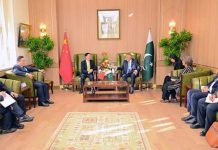-Pakistan unveils another dossier on war crimes, rights violations in IoK
-India urged to stop Human Rights Violations of Kashmiris
-Actions sought against the perpetrators who have been highlighted in the dossier
-The dossier calls for quick end to demographic changes
-Seeks release of all political prisoners
By Asghar Ali Mubarak
ISLAMABAD: Foreign Minister Shah Mahmood Qureshi, along with National Security Adviser Dr Moeed Yusuf and Federal Human Rights Minister Shireen Mazari, on Sunday presented a detailed dossier on war crimes and human rights violations in Indian-occupied Kashmir.
Foreign Office spokesperson Asim Iftikhar, while presenting statistics and figures from the dossier, exposed India’s nefarious activities and said that the country is operating five training camps for UN-designated terrorist organisation Daesh.
He stressed that there was a “great need” to make the world aware so that action could be taken to bring an end to the grave human rights violations in IoK.
“This dossier is a step in that direction,” he said. During his brief, Iftikhar pointed out that Indian patronage and training of the militant Islamic State group was a “serious concern”. He alleged that evidence suggested India was operating five training camps in Gulmarg, Raipur, Jodhpur, Chakrata, Anupgarh and Bikaner.
“By injecting these state-trained ISIS fighters, India may try to establish linkages of the freedom movement with international terrorism in order to malign the freedom struggle and to justify its own crimes as counter-terrorist operations,” he said.
Addressing a press conference in Islamabad, the foreign minister pointed out that the decision to compile the dossier was taken due to the actions of Indian authorities after the death of Kashmiri separatist leader Syed Ali Geelani and their treatment of his family.
“We decided that considering the situation there, (IoK) and the kind of government’s thinking present there, we should play our role and unveil the real face of this India government claiming to be the world’s biggest democracy before the world,” he said. Qureshi said there was a continuing communications blackout in IoK as independent journalists and observers were denied access, while facts were distorted and brutalities went unreported “by design”.
The foreign minister said the dossier comprised 131 pages and had three chapters: one on war crime by the Indian army and its genocidal actions, second on the disappointment of Kashmiris and how a local resistance movement is being born despite the propaganda of everything being normal, and a third chapter on how UN Security Council resolutions, international laws and humanitarian laws were being violated through efforts to bring about a demographic change in the valley.
FM Qureshi pre-empted any concerns regarding the dossier’s credibility, explaining that the majority of the references in it were from international and Indian media outlets as well as international human rights organisations such as Amnesty International and Human Rights Watch.
Calling upon the media to examine it for itself, the foreign minister said the dossier contained details on a vast range of incidents and atrocities from war crimes, extrajudicial killings, arbitrary arrests, torture, pellet gun injuries, rapes, over 100,000 cases of children being orphaned, search and cordon operations, false flag operations, fake encounters and planting of weapons on innocent residents to implicate them and harm the resistance movement.
Responding to a question on the dossier’s dissemination, Qureshi said it was being printed and sent to Pakistan’s foreign missions and multiple forums, and that every method would be used to achieve “maximum circulation”.
Yusuf, the NSA, meanwhile, said: “My request would be to remember that this dossier and its timing are a tribute to Geelani sahab. His whole life was spent for this purpose (IoK’s freedom) but the struggle continues and we have to bring it to completion.”
FM Qureshi said protecting fundamental human rights was not just the state’s responsibility but there were international obligations, instruments and mechanisms to ensure their protection and that they should be fulfilled.
“The UN must compel India to allow access to special procedure mandate holders of the UN Human Rights Council for an independent investigation of human rights violations taking place in IoK,” he said. “The UN department of peacekeeping operations must note the names of individuals and units in IoK who have been directly responsible for human rights violations. They should be identified, named and disallowed to be part of UN peacekeeping operations.”
The foreign minister presented the following five demands after the briefing: India to stop human rights violations of Kashmiris; Action taken against perpetrators highlighted in the dossier; An end to demographic change; An end to the military and digital siege; Release of all political prisoners; Allow unhindered access in IoK to the UN, the independent permanent human rights commission of the Organization of Islamic Cooperation, independent journalists, human rights organizations and civil society organizations.
Meanwhile, the human rights minister questioned the UN for not placing sanctions on India despite contravention of its resolutions and asked it and the international community why they did not push India to allow access of UN observers in IoK.
“I also want to call on the UK that made special sanctions laws after it left the EU. Why is the UK not bothering to assert itself on the human rights issue [in IoK]? because of business interests?” she railed, adding that Pakistan was told that human rights were a central focus of Western countries’ foreign policies.
“But if you do not fairly apply your own principles of foreign policy across the board this means that there is no respect of human rights by these Western states.”
Mazari lobbed similar criticism at the European Union for not giving a statement against India’s annexation of IoK, asking why sanctions were continued on Russia on the Crimean issue while there were none on India.
“Why is there duplicity of standards? The change in demography in an occupied territory is a war crime according to the fourth Geneva Convention. Why is not anyone taking notice? You can’t cherry-pick,” she thundered.
“The UN Security Council (UNSC) presidency has been given to India at a time when the Indian government is a Hindutva-fascist regime like the Nazis. Would the UN have allowed a Nazi regime to chair the UNSC presidency?
“This hypocrisy has to be exposed because we are going to get more lectures on human rights in our region from Western democratic countries. So we need to be prepared and not be defensive and say, ‘show us your intent by implementing your own policies you made for yourself against India and its occupation in IoK’,” the human rights minister said, adding that unless they did, there would be “no credibility” to their claims of upholding human rights.
The foreign minister agreed with Mazari and said history showed that a policy of appeasement did not work.
“This is the time to jolt the conscience of the world, wake them up and tell them [to] act now before it is too late. These policies of appeasement are not just destabilising the region but will have far-reaching consequences,” he said.
Qureshi acknowledged that while there were political interests of countries with India, they also had higher values and called upon them to demonstrate and act on them if they believed in them.
Meanwhile, Yusuf said: “There is nobody today who behind closed doors defends what India is doing. I think we should be clear about this. What is happening in IoK is so egregious that there is no possibility that anyone can tell you with a straight face that what Pakistan is saying is wrong.”
Instead, he claimed, it was conceded that there were economic reasons and other interests for not doing so. “That is the barrier that the world will have to break for its sake, not Pakistan’s sake.
“This is exactly how Europe talked about Hitler and we saw what happened. We are clear where this is going, the region is going to be affected first but the entire world will be affected as well,” Yusuf warned. When questioned on why India’s alleged involvement in fomenting terrorism from Afghanistan wasn’t addressed, the NSA opined that one reason was India’s interests with the world such as being a counterweight to China.
“Look at what’s happening inside India and look at the power that China wields. It’s laughable to think that this country can be a counterweight except unto itself but it is what it is. “There is a clear shift in what the world thinks about India. I’m not taking any credit for ourselves, India is what it’s doing inside the country and the world is seeing that,” the NSA said.




